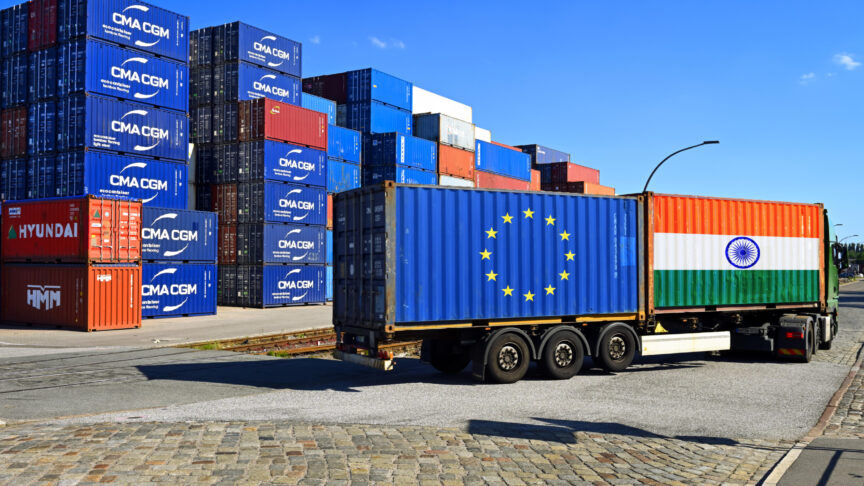A majority of Europe’s voters do not consider migration to be the most important issue, according to major new poll
Corruption, living standards, housing, unemployment and health rank above, or alongside, migration as key issues for European voters. Despite anti-immigration rhetoric across Europe, many voters view domestic issues as chief concerns. Voters in Greece, Italy, Poland, Romania and Spain are more concerned about people leaving their country than coming in.
See the exclusive coverage in The Guardian, Süddeutsche Zeitung, Gazeta Wyborcza, Le Monde, La Stampa and La Vanguardia.
Despite what Viktor Orban, Matteo Salvini and Steve Bannon have said, the EU elections will not be a referendum on migration. While migration is important for some voters, it is not the only battleground for votes ahead of the European Parliament elections, according to a major new poll by the European Council on Foreign Relations (ECFR). The think-tank’s poll finds that emigration and domestic issues, such as corruption, the cost of living, health, housing, and unemployment, also feature prominently among voters.
The poll, carried out by YouGov across 14 European Union (EU) member states covering 80% of the seats in the European Parliament, provides a snapshot of opinion across major issues, such as security, migration, climate change, living standards and national economic performance. Its findings challenge the view of anti-European leaders such as Viktor Orban and Matteo Salvini, as well as pro-Europeans like Emmanuel Macron, that the forthcoming elections will be fought on a single issue: migration.
Among its top lines, the new poll reveals that domestic subjects, such as corruption, housing, health, pensions and unemployment, rank alongside or above immigration in many member states, and that, in Western Europe, voters are generally supportive of refugee resettlement efforts.
It also suggests that, despite anti-European efforts to frame the European Parliament elections as a referendum on migration, voters in Italy, Poland, Romania and Spain are more concerned about people leaving their country than coming in.
On other issues, such as economic performance and climate change, the poll shows that voters are generally pessimistic about the strength of their national economies, and that there are majorities in 13 of the 14 polled member states for the introduction of greater protections for the environment – even at the cost of impacting economic growth.
Mark Leonard, Director of the European Council on Foreign Relations, said:
“The EU elections have been sold as a battleground over the heart of Europe. Viktor Orban, Matteo Salvini and Steve Bannon have tried to turn the election into a referendum on migration, mobilising a sovereigntist coalition to dismantle the EU from inside. The findings from this poll should give heart to pro-Europeans, and show that there are still votes to be won on major issues such as climate change, healthcare, housing, and living standards. They will be making a strategic blunder if they accept the framing of the anti-European parties that this election will be won or lost on migration alone.
“To mobilise these voter constituencies, though, pro-European parties need to provide a serious and honest assessment of the EU’s failings. They must be international and outward-looking reformers, who will speak and act for Europe’s moderate majority.”
At a pan-European level, the polling finds that:
- Islamic radicalism is widely identified as the single-biggest threat to the future of Europe.
- There are majorities, in every member state, for better protecting Europe’s borders – with voters in Austria (80%), the Czech Republic (84%), Greece (89%) and Romania (77%) most supportive of this statement.
- Immigration is a recurring issue but is not always among the two dominant subjects for voters in member states.
- Health, housing, unemployment, and living costs are standout issues in many countries – with notable voter traction in the Netherlands, Austria, Hungary, Poland, Spain, France, Italy, Denmark, Sweden, Germany and Romania.
- In Spain and Italy, unemployment, rather than immigration, is a primary issue for voters – with almost half of those polled in each country (42% and 47%) identifying it as their chief concern.
- The four countries that identified immigration as a lead issue were: Austria, Denmark, Germany and Sweden.
- In many countries, such as Italy, Poland, Romania and Spain, voters are more concerned by emigration than immigration.
- There is a general consensus, in Western Europe, that refugees should be more fairly distributed across member states – with the key countries affected by the 2015 migration crisis, such as Germany, Greece, Italy, Netherlands and Sweden, most supportive of this policy proposal.
- Corruption is cited as a major domestic issue in Greece (by 78% of voters), Hungary (by 72% of voters), Italy (by 70% of voters), Slovakia (by 68% of voters), Spain (by 74% of voters) and Romania (by 69% of voters).
- There are majorities in each member states to issue stiffer sentences to people who break the law.
- In every Member State, apart from Denmark and Germany, a minority of voters think their economy is performing well.
- Voters in Greece, Hungary, Romania, Slovakia and Spain are most pessimistic about the strength of their national economy.
- Voters in every member state, save Denmark and Sweden, believe that big business is taking advantage of ordinary working people.
- In 13 of the 14 polled member states, climate change is seen as a major threat that should take priority over other issues – even to the point of impacting national economic growth
At a country-specific level, it shows that:
- Italian and Spanish voters are more concerned about emigration than immigration.
- Just 21% of French voters see immigration as a significant issue facing the country, with cost of living topping the poll at 36%.
- Despite strong anti-immigration rhetoric from administrations in Hungary and Poland, only 19% and 7% of voters in each country identify immigration as a chief issue.
- In Germany just 25% of voters think that migration has had a negative impact on their wages.
- German voters are generally split down the middle on the benefits of economic migration – with 39% in favour of addressing skill deficits with foreign talent, and 42% against.
- Of those polled, voters in Denmark (53%) are particularly worried about people coming into their country – with Slovakian voters (61% from a smaller sample size) also citing this is a major concern.
- Of the polled member states, voters in the Greece and Slovakia are the most likely to think that migration has had an impact on jobs and wages.
The YouGov poll forms part of a major pan-European project by ECFR to understand the wants of voters ahead of this year’s European Parliament elections.
The primary aim of the ECFR project – entitled ‘Unlock Europe’s majority’ – is to show how different parties and movements can give the pro-European and internationally-engaged electorate of the European Union a new voice. ECFR will use the data from the YouGov polling, and other research, to engage with political parties, civil society allies, and media outlets, and help them frame nationally relevant issues in a way that will reach across constituencies and capture the ears of voters. The media output of this project will comprise two rounds of pan-European polling and the publication of three major policy reports. The project’s first report, ‘The 2019 European Elections: How anti-Europeans plan to wreck Europe and what can be done to stop it’, was published on 11 February 2019.
Susi Dennison, Senior Fellow and Director of the European Power programme at ECFR, said:
“Pro-European parties should see clearly in this data that there are different elections to fight in each member state, and a significant proportion of the mobilised electorate who want to hear good arguments on these issues. In Germany, Austria and Greece, voters are as – or more – worried about the effect of the rise of nationalism on Europe than migration.
“The level of pessimism among European voters shows that pro-Europeans cannot afford to allow the anti-parties to frame them as defenders of the status quo. More of the same is not a good message on any of the salient issues.”
-ENDS-
- The new ECFR ‘Unlock Europe’s Majority’ project aims to push back against the rise of anti-Europeanism and show how internationalist and forward-thinking parties can effectively rally and unmute moderate voices across Europe. The project has an active presence in five Member States, and also working in an additional nine EU countries that will be most decisive in terms of the number of parliamentary seats. For more information about this project, and details of its outputs to date, please visit: https://ecfr.eu/europeanpower/unlock.
- Countries polled by YouGov in Stage 1 of this project include: Austria, Czech Republic, Denmark, France, Germany, Greece, Hungary, Italy, the Netherlands, Poland, Romania, Slovakia, Spain, and Sweden. Fieldwork was undertaken between 23rd January – 25th February 2019.
- ECFR and YouGov will undertake a second round of polling in EU Member States in March 2019. The results of Stages 1 and 2, and the findings of related focus groups, will be compiled into a major ECFR report for release to the media in April.
- ECFR experts working on this project include: Mark Leonard, Susi Dennison, Vessela Tcherneva, Jose Ignacio Torreblanca, Almut Moeller, Josef Janning, Piotr Buras, Manuel Lafont Rapnouil, Susanne Baumann, and Pawel Zerka. ECFR is also working with the Chairman of Liberal Strategies, Ivan Krastev, and LSE’s Professor Simon Hix.
- For broadcast requests relating to this polling or the ECFR elections project, please contact Ana Ramic, Head of Communications, on: E: [email protected] / T: + +49 (0) 30325051027.
- For all other media requests, please contact: David Yorath, Apollo Communications, on E: [email protected] / T: +44 (0) 7511467771
About ECFR:
The European Council on Foreign Relations (ECFR) is a pan-European think-tank. Launched in October 2007, its objective is to conduct research and promote informed debate across Europe on the development of coherent and effective European values based foreign policy. ECFR is an independent charity and funded from a variety of sources. For more details, please visit: www.ecfr.eu/about.
The European Council on Foreign Relations does not take collective positions. ECFR publications only represent the views of their individual authors.


